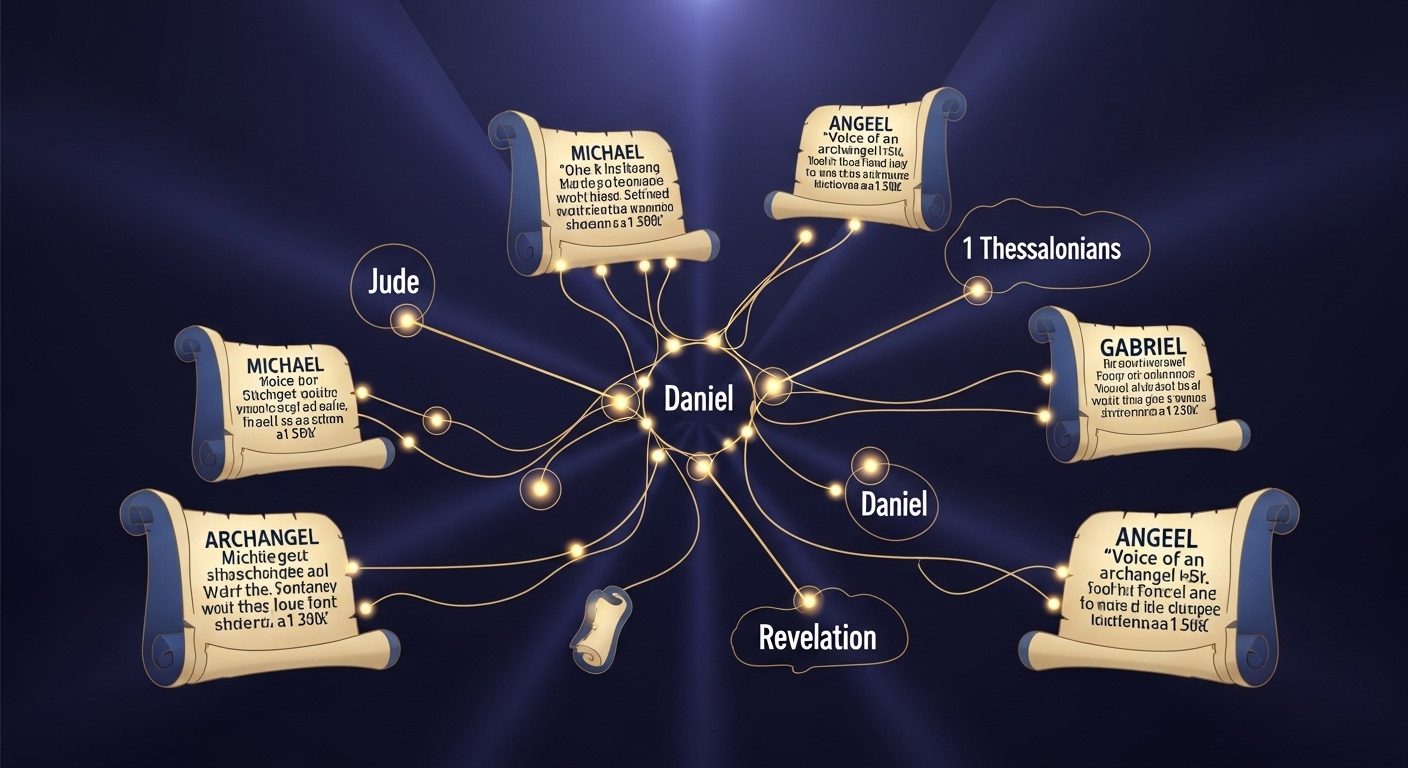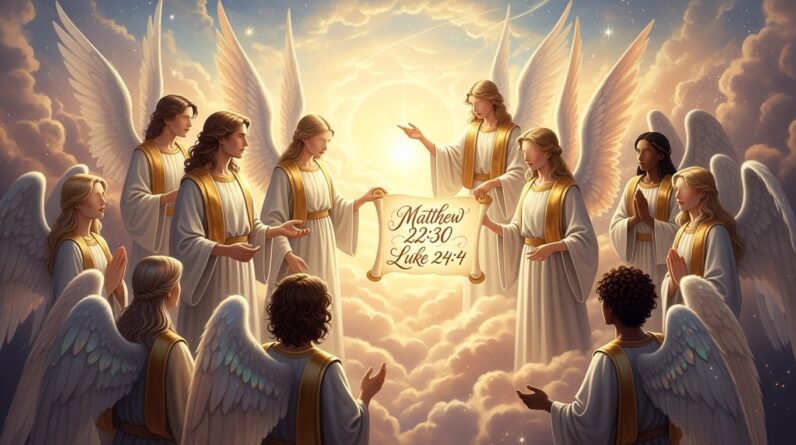Who Are The Archangels In The Bible? (Jude 1:9; 1 Thessalonians 4:16)

Have you ever wondered who those powerful, mysterious angels are in Scripture—the ones who seem to stand nearest God’s throne and to act with authority in the spiritual realm? You’re not alone. The Bible mentions archangels in only a few places, and the limited references have sparked centuries of curiosity, debate, and devotional reflection. In this article, you’ll explore what the Bible actually says about archangels, who are named, how different traditions interpret those references, and why it matters for your faith today.
Introduction
Have you felt uncertain about spiritual realities—angels, spiritual warfare, and the unseen forces at work—and wished Scripture were clearer? You’re in good company. The Bible doesn’t give you a long catalog of archangels, but what it does say is rich and worth unpacking. Knowing who the archangels are helps you understand how God cares for his people, how spiritual authority operates, and how to trust God when life gets confusing. Together, we’ll look at the key passages, the plain meaning, the deeper implications, and how this affects your daily walk with God.
The Bible Foundation
Jude 1:9 (NIV): “But even the archangel Michael, when he was disputing with the devil about the body of Moses, did not himself dare to condemn him for slander but said, ‘The Lord rebuke you!'”
(Jude 1:9)

This single verse is crucial because it explicitly uses the title “archangel” and attaches it to Michael. The short passage refers to an event (disputing over Moses’ body) that isn’t narrated in the Old Testament, which has led some scholars to believe Jude is alluding to an oral tradition or an extra-biblical source (some point to Jewish writings like 1 Enoch). What matters here is the lesson: Michael demonstrates humility and submission to the Lord’s authority—even in spiritual conflict.
Another key verse is 1 Thessalonians 4:16 (NIV): “For the Lord himself will come down from heaven, with a loud command, with the voice of the archangel and with the trumpet call of God…”
(1 Thessalonians 4:16)
This verse links the end-time coming of the Lord to the “voice of the archangel,” implying an angelic role in announcing or initiating Jesus’ return. The passage doesn’t name which archangel, but it establishes that at least one high-ranking angelic voice will accompany Christ’s return.
Those two passages are the clearest New Testament references. To add perspective, you’ll also want to consider Old Testament passages that highlight Michael’s role:
- Daniel 10:13 (NIV): “But the prince of the Persian kingdom resisted me twenty-one days. Then Michael, one of the chief princes, came to help me…”
(Daniel 10:13) - Daniel 12:1 (NIV): “At that time Michael, the great prince who protects your people, will arise…”
(Daniel 12:1)
Daniel presents Michael as a protector and leader among heavenly beings. These references, alongside Jude and 1 Thessalonians, form the biblical foundation for understanding archangels.
Understanding the Core Truth

At its core, the Bible reveals that archangels are high-ranking angels who serve God’s purposes in critical, authoritative ways. The Scriptures explicitly name Michael as an archangel (Jude 1:9) and show him acting as a defender of God’s people (Daniel). Another passage, 1 Thessalonians 4:16, implies that archangel-level authority participates in Christ’s return.
Importantly, the Bible doesn’t give you a long list of named archangels. It doesn’t say “here are seven archangels” in the Protestant canon. Instead, Scripture demonstrates that God uses powerful angelic beings to carry out significant tasks: protecting the faithful, executing judgment, delivering messages, and announcing Christ’s return. That’s the core takeaway: archangels are servants of God’s sovereign plan, not independent spiritual rulers.
Going Deeper — The Hidden Meaning
Beyond facts and names, what’s the heart-level truth? First, the way Jude presents Michael—refusing to bring a slander charge against the devil and instead invoking “The Lord rebuke you”—shows spiritual maturity. Michael doesn’t act presumptuously; even as an archangel, he defers to God’s authority. That humbling example points you toward faithful humility: you don’t need to claim God’s power for yourself; you rely on God.
Second, when the “voice of the archangel” is mentioned in 1 Thessalonians, it underscores that the cosmic events of the last days will be both divine and orderly. The presence of archangels signals that God marshals spiritual realities for his purposes—order, authority, and divine timing.
Third, differences in Christian tradition (for example, Catholicism naming Gabriel and Raphael as archangels, or extra-biblical books like 1 Enoch listing many) reveal how humans seek to fill biblical gaps. Those traditions can be meaningful devotionally, but they shouldn’t replace what Scripture plainly teaches.
A relatable example: imagine a courtroom where one respected judge refuses to overstep and cites the chief justice instead. That judge’s restraint honors the system and points people to the highest authority. Similarly, Michael’s restraint points you to God’s ultimate rule and the assurance that God is in charge—even when spiritual battles feel chaotic.
Modern Connection — Relevance Today

So why should this matter to you? Because understanding archangels helps you trust God in crises, recognize spiritual authority, and avoid sensationalism. When you face injustice, spiritual attack, or fear about the future, the biblical picture of an ordered heavenly realm—where archangels serve God and act under his authority—gives you solid confidence.
Knowing Michael is an archangel who protects God’s people reassures you that God provides guardianship and leadership that surpass human strength. Knowing that archangels act under God’s authority warns you against chasing angelic encounters or speculative teachings that place angels above Christ.
In family life, work, or church conflict, you can apply the posture Michael models: act with authority only when you have mandate, rely on God’s word and prayer, and trust divine justice. When anxiety about the future arises—especially about end-times topics—remember 1 Thessalonians: the Lord’s return is orderly and will be announced in a way that God orchestrates. That should steady your heart.
Practical Application — Living the Message
Here are simple ways you can live out these truths:
- Anchor your hope in Christ’s authority. When you worry about spiritual realities, confess that Christ is Lord and that even angelic beings act under him.
- Practice humility in spiritual matters. If you feel tempted to claim special spiritual insight or authority, follow Michael’s example and defer to God’s revealed word.
- Pray with biblical language. Ask God to “rebuke” what oppresses you, and trust God to act even if you don’t see immediate results.
- Learn Scripture carefully. Avoid sensational claims about angels that aren’t supported by the Bible. Let Scripture shape your imagination about the spiritual world.
- Live courageously. Knowing God orders the cosmos frees you to love others, serve faithfully, and resist fear.
These actions are straightforward but powerful: they ground you in Jesus, not in extraordinary experiences.
Faith Reflection Box
Take a moment to reflect: When you feel spiritually overwhelmed, do you look to God’s authority first—or to spiritual signs, feelings, or human leaders? How might you practice a posture of humble submission like Michael in a situation you face this week?
Key Takeaways
- Michael is explicitly named an archangel in Scripture (Jude 1:9), and he protects God’s people (Daniel 12:1).
- The Bible mentions “the voice of the archangel” in connection with Christ’s return (1 Thessalonians 4:16), showing angelic involvement under God’s authority.
- Scripture models humility and submission even for heavenly beings—your strength comes from trusting God, not claiming spiritual power.
- Avoid speculation: rely on the Bible’s clear teaching and let it shape your belief and practice.
Q&A
Q1: Who is the archangel Michael, and what does Jude 1:9 teach about him?
Answer: Michael is the only angel explicitly called an archangel in the New Testament (Jude 1:9). In that verse, Michael disputes with the devil over Moses’ body but doesn’t bring a slander charge; instead, he says, “The Lord rebuke you!” This shows Michael’s humility and submission to God’s ultimate authority. Michael’s role in Daniel as a protector of God’s people (Daniel 12:1) complements Jude’s point, presenting an archangel who defends but does so under God’s rule. See Jude 1:9 and Daniel 12:1.
Q2: Is Gabriel called an archangel in the Bible?
Answer: In the canonical Protestant Bible, Gabriel is not explicitly titled “archangel.” He appears as God’s messenger in Daniel and Luke—delivering significant revelations (Daniel 8:16; Luke 1:19, 1:26–38). Because Gabriel delivers high-stakes messages, some traditions regard him as an archangel, but Scripture doesn’t use the label. For references, see Daniel 8:16 and Luke 1:26–38.
Q3: How many archangels are there?
Answer: The Bible does not give a definitive number. Jude names Michael as an archangel; 1 Thessalonians refers to “the archangel” as if an office exists. Some extra-biblical and deuterocanonical writings (like Tobit or 1 Enoch) list several archangels (e.g., Raphael, Gabriel, Michael), and Catholic and Orthodox traditions often name three (Michael, Gabriel, Raphael). Protestant traditions tend to stick closely to the canonical texts, recognizing Michael explicitly and honoring other angels without assigning them the formal title unless Scripture does. See Jude 1:9.
Q4: Does the mention of the “voice of the archangel” tell us who will announce Christ’s return?
Answer: 1 Thessalonians 4:16 speaks of “the voice of the archangel” but doesn’t name which angel that will be. The emphasis is on the authority and clarity of Christ’s return—accompanied by a commanding, heavenly announcement. The precise identity of this archangel is less important than the assurance: the event is divinely orchestrated and unmistakable. See 1 Thessalonians 4:16.
Q5: Should I pray to archangels or ask them for help?
Answer: Scripture directs your worship and prayer to God alone. Angels are God’s servants and messengers; they aren’t objects of worship (Revelation 22:8–9). It’s appropriate to ask God for protection and to thank him for his angels’ care, but Scripture models direct prayer to the Father, through Jesus, empowered by the Spirit. See Revelation 22:8-9.
Conclusion & Reflection
You don’t need a long list of named archangels to find comfort and guidance. The Bible gives you enough to know that God surrounds his purposes with order, authority, and protection. Michael’s example teaches humility and trust; 1 Thessalonians reminds you that Christ’s return is decisively announced and sovereign. Let these truths steady your heart: God leads, angels serve, and Jesus reigns. Pray this simple prayer with me:
Lord Jesus, thank you that you rule over heaven and earth. Help me to trust your authority, follow your word, and live humbly like Michael—relying on you in every battle. Guard my heart from fear and guide my steps by your Spirit. Amen.

More Inspiration Awaits — Read These Next
👉 For deeper insight into Isaiah 40:31 and how it renews your strength in both faith and daily life
👉 For practical lessons on compassion and neighborliness from the Good Samaritan
👉 For a clear explanation of what we can learn from the Parable of the Good Samaritan
👉 For meaningful insights from the Parable of the Pearl and its hidden treasures
👉 For a deeper look at the Rich Man and Lazarus and what it reveals about the afterlife
👉 For guidance on the Parable of the Ten Virgins and preparing for God’s Kingdom
👉 For clarity on the Parable of the Lamp and how it calls us to shine our light
👉 For insights from the Parable of the Wedding Feast and the meaning behind the invited guests

📘 Jesus and the Woman Caught in Adultery – Grace and Mercy Over Judgement
A powerful retelling of John 8:1-11. This book brings to life the depth of forgiveness, mercy, and God’s unwavering love.
👉 Check it now on Amazon 🛒💥
🔥 “Every great message deserves a home online.” 🌍💬🏡
Don’t let your calling stay hidden. Start a Christian blog or website using Hostinger — with 99.9% uptime, a free domain, and SSL, your voice can shine for God’s glory anytime, anywhere.
💥 Begin today. 🛒 Try it RISK-FREE! ✅
✝️ “Your body is God’s temple — care for it with purpose.” 💪💖🏛️
Renew your energy and restore balance naturally. Mitolyn helps support a healthy metabolism, giving you the vitality to live out God’s calling with strength and confidence.
🔥 Unlock Your Metabolic Power! ⚡Burn More Calories & Feel Great With Mitolyn. 💪
👉 Start Today. 🚀 Check Price Now. 🛒💰
💰 As a ClickBank & Amazon Affiliate, I earn from qualifying purchases.
📖 Acknowledgment: All Bible verses referenced in this article were accessed via Bible Gateway (or Bible Hub).
🚀 Want to explore more? 👉 Dive into our new post on Why Jesus? and experience the 🔥 life-changing truth of the Gospel!







